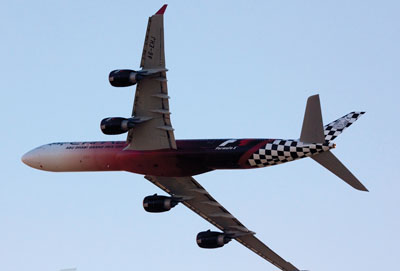
Features
Operations
Alternate Approach: Flying the checkered flag
After a one-year hiatus, Formula One (F1) rolls back into Montreal in June with a record number of airline companies helping to drive the world’s most expensive sport.
May 13, 2010 By David Carr
After a one-year hiatus, Formula One (F1) rolls back into Montreal in June with a record number of airline companies helping to drive the world’s most expensive sport.

|
|
Airline sponsorships in F1 are not new. Saudi Arabian Airlines featured prominently on a British racing team between 1978 and 1985, and Air Canada was the title sponsor of the Canadian Grand Prix until 2003, the first airline to do so. But the global ban on tobacco advertising snuffed out sponsorship opportunities, and left F1 scrambling to fill the gaps in its $1-billion-a-year advertising habit. Air Canada picked up the Canadian Grand Prix in 1999 from John Players, an early tobacco sponsor.
For the 2010 season, Gulf Air, Qantas and Etihad Airways are title sponsors of F1 races, with the Abu Dhabi-based carrier also an advertising partner in Ferrari Formula One, the most prestigious badge in auto racing. This year, Etihad is one of four airlines sponsoring race teams to various degrees including India’s Kingfisher Airlines and Britain’s Virgin Atlantic, albeit as part of the larger Virgin Group.
Virgin came up trumps in 2009, stepping in as the 11th hour title sponsor in little known British-based Brawn GP only to ride its investment, car and driver Jenson Button to a series of checkered flags and a World Championship. Nobody is expecting lightning to strike twice. Virgin launched its own F1 team in 2010 but has struggled out of the starting gate.
Even a slow start cannot devalue the thrill and glamour of F1 and exotic locations such as Shanghai and Monaco. An estimated 600 million tune in to each Grand Prix for an accumulated audience of 11.4 billion viewers over a 19-race calendar. In comparison, the worldwide audience for the Vancouver Olympics was 3.5 billion.
Formula Money, a UK publication that tracks financial performance calculates that Virgin realized a 496 per cent return on investment (ROI) last year. Still, ROI depends on how long a branded car is burning up the track. No small consideration in a sport where race day attrition is as common as tire changes and victory champagne.
For Etihad, whose logo appears on the front and tail wings of the two iconic red Ferrari’s, linking a six-year-old airline with the 80-year pedigree of the classic automaker increases global brand prestige and credibility.
Etihad took top honours at the Arabian Sponsorship Awards for its support of the inaugural Abu Dhabi Grand Prix in 2009, which included two aircraft kitted out in a special F1 livery. In a twist on F1 car maker’s traditional win on Sunday, sell on Monday, business model, Etihad reported a record-breaking spike in website visits and bookings.
None of this comes cheap. Fees for hosting a race have doubled over the last five years to approximately $30 million as governments in Middle East and Asian countries use F1 and spectacular facilities to promote tourism and economic development even as they struggle to fill the stands. (It is estimated that Air Canada paid $5 million to host the 2003 Canadian Grand Prix.)
Except for Virgin, airline sponsorship has come from non-European markets. British Airways was reported to be kicking the tires of home team McLaren on a value-in-kind basis that would have reduced the race team’s enormous transport costs in 2010, but no deal has surfaced. Two British world champions now drive for McLaren, a key selling point for British Airways’ so-called Revenue Lab, a cross-business unit aimed at filling seats by aligning the airline with changing markets. Emirates is also expected to jump back into F1 after sponsoring the McLaren team for one season in 2006.
Cost remains a factor, opening the door for advertisers to leverage the enormous viewership of F1 with one-race deals in home markets. Timing is everything. Last year, a Brazilian brewery paid $500,000 to sponsor Brawn at the Sao Paulo Grand Prix where Jenson Button captured the World Championship, for an estimated 853 per cent ROI.
F1 is not without challenges including rules that produce some very dull races. Sponsorship is not as stable as when big tobacco was involved. Value for money has squeezed premier car makers out of the sport and there is concern newer teams lack funding to make it through the season. But as a marquee sporting property F1 has the engines, luxury destinations and elite drivers that premium airline brands are paying to be a part of.
David Carr is a Wings writer and columnist.